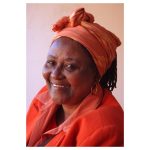Tshabalala refashions theatre in his own image
Jefferson Tshabalala, the Standard Bank Young Artist Award winner for theatre, creates innovative and experimental work that prioritises black experience and culture.
Author:
20 February 2020

Jefferson “JBobs” Tshabalala poses with a carry-on suitcase in the group photo of the 2020 Standard Bank Young Artist Award winners. In it there is sufficient space for a USB containing scripts, his published plays, DVDs of his recorded shows for him to sell, and costumes. The presence of the pink suitcase is not incidental. It is an official image of the theatre he makes.
Tshabalala figured out early on that creating any kind of theatre required him to be able to travel with it, alone, and without paying any luggage fees. The suitcase also represents the ease of what he does: sketching, a form that involves the creation of short, comic and satirical skits, is his preferred style of performance.
At face value his theatre seems minimalist, but it is substantial by other measures. Nuanced and heightened text is paramount in Tshabalala’s work. His chief interest is the lived experience of the majority of people in South Africa. It’s about showing, in a visceral way, what black people have to say, more than what they can do, and portraying their full range with all of its beautiful and unpretty parts.
Protest theatre for today
South Africa is known for its tradition and history of protest theatre. With his work, Tshabalala is changing the face of it today. Not only does he thematically challenge the politics of the day, but his rebellion also seems rooted in challenging the rules that govern theatre-making and creating new ones that prioritise black experience and culture.
His award-winning and commercially successful productions, Location/Lekeyishene/Lokasie (LLL) and Off the Record (OTR), performed as a double bill and sometimes separately, are sketches described as taking the “hybrid format of a panel, quiz and game show”.
LLL, popular in the townships, is upbeat and zooms in on the idioms and back stories that shape township life, lingo and currency. It is a relationship with content and history that allows the audience to relish the pool of blackness and celebrate it. Taking on the life of black game shows like Zama Zama, Jika Majika and Jam Alley, you get quizzed and educated about how R1 000 got to be called istina in township lingo while you master a dance move or a kwaito song for points. Doing it this way highlights the diversity among black people and shows how geographical distance can create relational distance.
Related article:
OTR, which has more national traction, is a holistic and communal engagement with the complexities and politics of the country. A little less raucous than LLL but with similar competitive enthusiasm, it is a quiz show in which you may be asked to name the official languages included in the national anthem and list them in order of appearance, for example. It touches on the textures of affluence, suburbia, academia and corporate life, exploring how black people navigate these spaces in relation to other races.
Both these highly informative and interactive shows turn the discussion about the considerations of audience participation on its head in that the audience is the show. Audience members get divided into two groups from which two contestants each go on stage to compete. The idea is to make theatre of the now that appeals to new audiences and how they consume content today. In OTR, for instance, audiences can google answers in real time.
Related article:
“I’m jealous of people who are not in my industry but who are in my practice,” Tshabalala says. “People who are not in theatre but are in entertainment or the creative arts. I look at amapiano and go, man, these guys are doing it. People are resonating, enjoying it and quoting it verbatim.
“That’s the response I want to elicit with my work. But my tools are the text, dramaturgy and live performance. I want that level of intensity with what I do, something that pierces through the cerebral and lands emotively. And the only way I can do that is to use a quintessentially black aesthetic.”
Beyond academia’s perspective
Tshabalala carved this creative path while studying. “When being taught about realism or naturalism in university we speak about nuance, layering and subtext,” he says. “You are required to display certain reactions to certain situations.
“Our natural responses as black people, where we react with our whole bodies, is discounted as fluff or an over-exaggeration in academia. From that moment I realised I’m being taught how to act white and that everything that is theatre must fit into that box.
“I found that dangerous, and I knew that my friends and I had to depart to the other side. I knew we were taking a risk because we were going to be ousted and misunderstood. But we were sure that that aesthetic was necessary for people to see black bodies on stage in a different formation.”
Related article:
He and his troupe of actor friends at the time, which included Tony Miyambo, Lereko Mfono and Zabalaza Mchunu, had already been writing and putting on plays since their university days. A 2012 preview of a Tshabalala-written political farce called Secret Ballot was a rough performance about the hypocrisy of corruption and tenderpreneurship, and its boisterous tone was at once a drawcard and a deterrent.
A few years later, Tshabalala channelled that boisterousness into a rhythmical text boasting a synergy of language and intellect with its heightened wordplay. It became the published play Khongolose Khommanding Khommissars (2017), whose wit and absurdity is reminiscent of Zakes Mda’s play You Fool How Can the Sky Fall.
Tshabalala’s other plays include Poet.O.Type (2014), a masterpiece of slam poetry and storytelling, and the recent Ekasi Lam (2019), a visceral critique of kwaito and township life.
Mobilising the community
As a successful independent theatre practitioner, Tshabalala excels at building and mobilising communities around him. This spills over into his interests in poetry, stand-up comedy and academia. He inherited his industrious nature from his parents in Port Elizabeth.
“My parents are tailors who had long perfected what we now call a side hustle. It’s not new to me to have to make my own way or generate income. When I was in university, that’s how I survived. I used to have to put up shows. However, working independently is not a necessity for me; it is something I’m very curious about and deliberate about pursuing because I don’t want to work forever. I want to create systems and institutions that can survive me,” Tshabalala says.
As part of this deliberate creation, his residency at the Market Theatre in Johannesburg has him curating an array of works for the Kippies space until November 2020. As this year’s Standard Bank Young Artist for theatre, he doesn’t skip a beat when asked what he will present for his National Arts Festival showcase. He is unfazed about complying with traditions. “I’ll be doing a sketch.”



